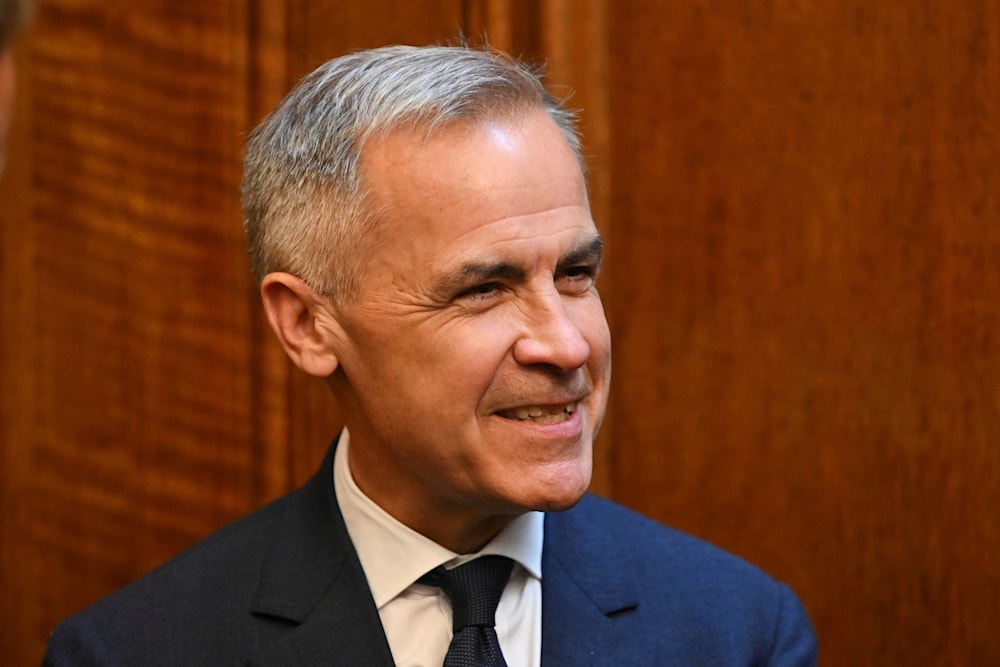Mark Carney sworn in as Canada's new prime minister
Carney comes in at a pivotal time for Canada, as he will have to face off the threat of more tariffs by Trump, who has been constantly pushing for his northern neighbors to become the 51st state.
-

Bank of England's former governor Mark Carney attends a meeting of the National Wealth Fund Taskforce at 11 Downing Street in London, on Tuesday, July 9, 2024 (AP)
Mark Carney has been sworn in as the new prime minister of Canada on Friday, replacing Justin Trudeau as the Great White North navigates rocky relations with the US amid Trump's constant barrage of tariffs on the United States' neighbor.
The ruling Liberal Party overwhelmingly endorsed Carney as Justin Trudeau’s successor, placing their confidence in his experience steering two central banks through historic crises to reassure Canadians amid the threat of a potentially devastating trade war.
"We're going to get right to work," Carney told reporters right before taking his oath of office, with his first cabinet meeting being set to take place after the swearing-in ceremony.
The 24th prime minister of Canada described Trump's policies as the most serious political challenge his country has faced in a generation, as he positions himself as uniquely suited to navigate Canada through a trade war with the United States, a former close ally that he now insists the country can "no longer trust."
Foreign Minister Melanie Joly stated during a G7 that the new prime minister will bring a new dynamic to the relations between Washington and Ottawa, noting that she and US Secretary of State Marco Rubio were focusing efforts on setting up a call between US President Donald Trump and PM Carney "in the next couple of days."
The new cabinet, reduced to 23 ministers from Trudeau's 36, retains key figures in managing relations with Washington, including François-Philippe Champagne as finance minister, Dominic LeBlanc shifting to trade, and Bill Blair staying on as defense minister.
Canadian politics witnessed an upheaval following Trump's series of tariffs on Canada, as he pushed toward turning it into the 51st state, bringing the race between Liberals and Conservatives from a 20% lead for the liberal party to a near draw.
"Carney is arriving at a good time. He has emerged as a figure people seem to trust to take on Donald Trump," politics professor Felix Mathieu told AFP, with Carney saying that he was ready to figure out a trade deal with the US, emphasizing that Canada's sovereignty must be respected under any negotiations.
The newly sworn-in prime minister strongly rejected Trump's bid to annex Canada, stating that his country "will never, ever, in any way, shape or form, be part of the United States" after taking the oath, noting that he hopes his government will find ways to work with the Trump administration.
Carney has actively sought to differentiate himself from Trudeau with policies aimed at appealing to centrist voters, emphasizing climate action as a priority while eliminating Trudeau’s "divisive" carbon tax on individuals and families in favor of market-driven solutions.
He is also halting a capital gains tax targeting Canada’s wealthiest, which the Trudeau government argued was crucial for stabilizing the country’s finances, stating on Sunday that builders should be incentivized to take risks and rewarded for their success.
Trudeau, US, and tariffs
In January, Trudeau announced he would step down after more than nine years in office due to a sharp decline in his approval rating, prompting the ruling Liberal Party to hold a swift leadership contest to find his successor.
"Make no mistake, this is a nation-defining moment. Democracy is not a given. Freedom is not a given. Even Canada is not a given," Trudeau said.
Carney, a political outsider, claimed he was the most qualified to rejuvenate the party and manage trade talks with Trump, who is threatening further tariffs that could damage Canada's export-driven economy.
In retaliation to Trump's tariffs on Canada, Trudeau has imposed C$30 billion worth of tariffs on the United States.
"My government will keep our tariffs on until the Americans show us respect," Carney said.
Carney's win marks the first time an outsider with no real political background has become Canadian prime minister.
He has said his experience as the first person to serve as the governor of two G7 central banks – Canada and England – meant he was the best candidate to deal with Trump.
The possibility of a fresh start for the Liberal Party under Carney, along with Trump's tariffs and his repeated threats to annex Canada as the 51st US state, sparked a remarkable revival in the party's fortunes.

 4 Min Read
4 Min Read








